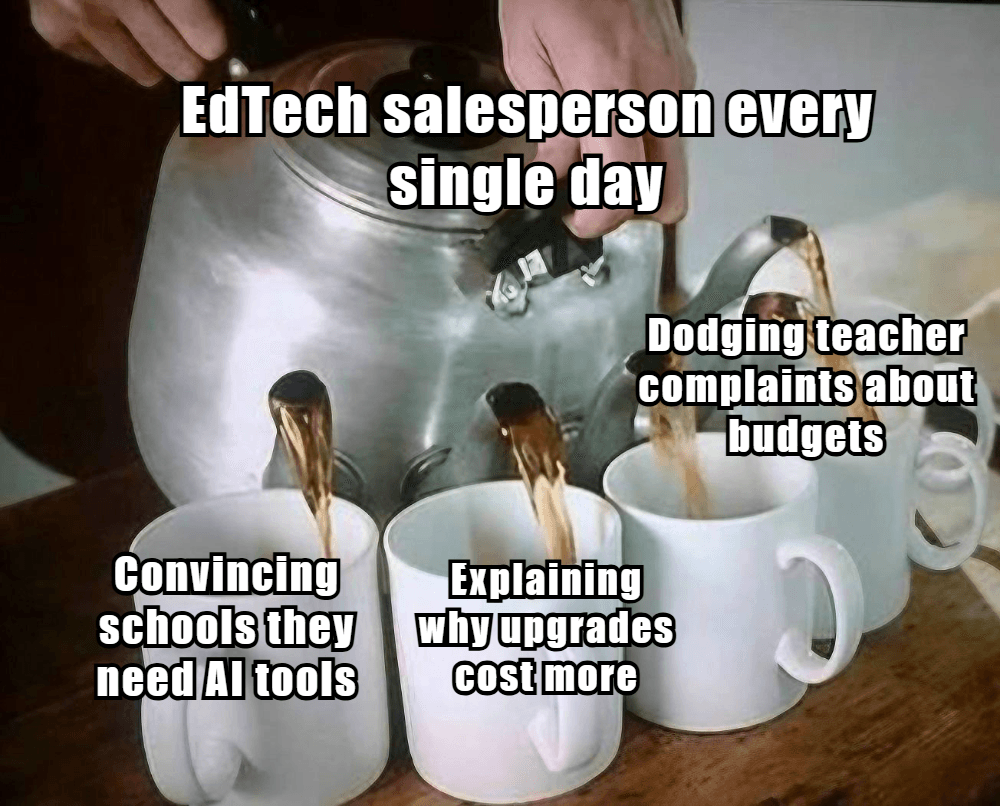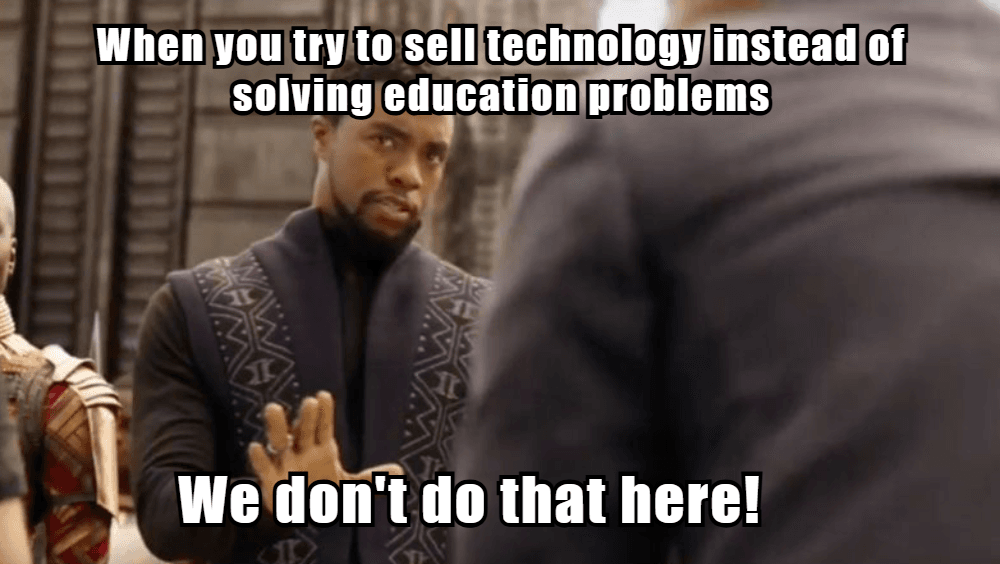How AI Is Transforming Education Technology Sales Jobs
Artificial Intelligence (AI) is transforming the education technology (EdTech) sector not just in how learning is delivered but also how EdTech companies operate, market, and sell their solutions. As AI becomes more embedded in EdTech products and business operations, the sales landscape is undergoing a massive shift. This article will explore how AI is changing EdTech sales jobs, the new opportunities and challenges it brings, and what the future holds for sales professionals in this fast-changing industry.
The Rise of AI in EdTech: Market Dynamics
AI in education is growing at an unprecedented rate. The global AI in education market was $5.88 billion in 2024 and is expected to grow at a compound annual growth rate (CAGR) of over 31% through 2030, with forecasts suggesting it could reach $84.73 billion by 2031615. This is driven by demand for personalization, adaptive technologies and efficiency gains – trends that are fundamentally changing how EdTech companies sell their products and services.
AI’s Impact on EdTech Sales Functions
1. Automating and Enhancing Sales Processes
AI is streamlining many traditional sales activities, enabling EdTech sales teams to operate with greater efficiency and precision:
Lead Identification and Qualification: AI-powered tools analyze vast datasets to identify and score leads, focusing sales efforts on the most promising prospects. This reduces time spent on manual research and increases the likelihood of successful conversions.
Sales Forecasting: Machine learning algorithms predict sales trends, helping teams optimize inventory, staffing, and resource allocation.
Personalized Outreach: AI enables hyper-personalized marketing and sales communications, tailoring messages to the specific needs and interests of each educational institution or buyer.
Automated Follow-Ups: Chatbots and automated email systems handle routine inquiries and follow-ups, ensuring timely responses and freeing up sales reps for higher-value activities.

2. Data-Driven Decision Making
AI equips EdTech sales teams with actionable insights:
Customer Analytics: By analyzing customer interactions and purchase histories, AI can suggest the next best action or product to pitch, increasing upsell and cross-sell opportunities.
Market Segmentation: AI-driven analytics help sales teams identify emerging trends and underserved segments, allowing for more targeted campaigns and product positioning.
Performance Optimization: Predictive analytics highlight which sales strategies are most effective, enabling continuous improvement and better allocation of resources.
3. Shortening Sales Cycles and Increasing Revenue
With AI handling much of the administrative and repetitive work, EdTech sales professionals can focus on building relationships and closing deals. This shift leads to:
Accelerated Sales Cycles: Faster lead qualification and follow-up reduce the time from initial contact to sale17.
Higher Conversion Rates: Personalized engagement and data-driven insights improve the likelihood of converting prospects into customers.
Scalable Customer Support: AI-powered chatbots and virtual assistants provide instant answers to client queries, supporting sales teams as they manage larger portfolios without sacrificing service quality.

New Skills and Roles for EdTech Sales Professionals
AI is not replacing human sales professionals but transforming their roles. The future of EdTech sales is about leveraging technology to enhance human expertise, not eliminate it.
1. From Transactional Sellers to Trusted Advisors
With AI handling routine tasks, sales professionals are shifting from transactional roles to becoming strategic advisors. They must:
Interpret and act on AI-generated insights.
Build deeper, trust-based relationships with educational institutions.
Offer consultative guidance on how AI-powered "EdTech Tools"can address specific challenges in teaching, learning, and administration.
2. Digital Fluency and Tech Savvy
Modern salespeople must be comfortable using a variety of digital tools, including:
Customer Relationship Management (CRM) systems are enhanced with AI.
Analytics dashboards for tracking engagement and sales performance.
Virtual meeting platforms and omnichannel communication tools.
3. Ethical and Transparent Selling
As AI becomes more integral to both EdTech products and sales processes, ethical considerations are paramount:
Sales professionals must understand and communicate how AI solutions handle data privacy, bias, and transparency.
Building trust requires openness about how AI-driven recommendations and decisions are made, especially when selling to institutions concerned with student data and equity.
AI in Action: Real-World Examples from EdTech Sales
Duolingo and Coursera:
Duolingo uses AI to personalize language learning, while Coursera leverages AI-based course matching to recommend relevant content to users. These companies use AI not only in their products but also in their sales and customer engagement strategies, driving rapid user growth and revenue increases.
Georgia Tech’s Jill Watson:
The AI teaching assistant “Jill Watson” demonstrates how AI can augment educational support, providing instant answers to student queries. For EdTech sales teams, success stories like this are powerful proof points when pitching AI-driven solutions to schools and universities.
Gradescope:
Gradescope’s AI-powered grading platform reduces grading time by 70%, a compelling value proposition for sales teams targeting overburdened educators.
AI-Driven Sales Coaching:
Some companies now use AI-powered dialog simulators to coach sales reps, analyzing conversations and providing personalized feedback to improve sales skills.

AI’s Role in the EdTech Sales Cycle
Stage | Traditional Approach | AI-Enhanced Approach |
Lead Generation | Manual research, cold calling | AI-driven lead scoring, targeted outreach |
Qualification | Intuition-based, slow | Data-driven, automated, rapid |
Engagement | Generic presentations, one-size-fits-all messaging | Personalized content, tailored recommendations |
Follow-Up | Manual emails, inconsistent timing | Automated, timely, and context-aware follow-ups |
Closing | Negotiation based on limited data | Data-backed proposals, predictive deal scoring |
Post-Sale Support | Reactive, resource-intensive | AI chatbots, predictive support, and proactive upselling |
While AI offers significant advantages, its integration into EdTech sales is not without challenges:
- Talent Shortage: There is a scarcity of sales professionals with both EdTech domain knowledge and AI fluency.
- Organizational Readiness: Many EdTech companies face hurdles related to data infrastructure, integration, and change management.
- Ethical Concerns: Ensuring fairness, transparency, and privacy in AI-driven sales processes is critical to maintaining trust with educational buyers.
- Market Complexity: The rapid evolution of AI tools can make it difficult for sales teams to stay up to date and effectively communicate value to clients.
The Future Outlook: What’s Next for EdTech Sales Jobs?
1. Continued Growth and Opportunity
The AI-driven EdTech market is expected to continue its rapid expansion, creating new roles and opportunities for sales professionals who can bridge the gap between technology and education.
2. Hybrid Human-AI Teams
Sales teams will increasingly operate as hybrid units, where AI handles data processing, forecasting, and routine communication, while humans focus on relationship-building, strategic selling, and ethical oversight.
3. Lifelong Learning and Upskilling
To stay relevant, EdTech sales professionals will need to continuously upskill, learning not only about AI technologies but also about the evolving needs of educational institutions and the regulatory landscape.
4. Greater Emphasis on Value-Based Selling
As AI makes it easier to quantify the impact of EdTech solutions (e.g., improved student outcomes, reduced administrative burden), sales conversations will shift toward demonstrating measurable value and ROI for educational clients.

Conclusion
AI is changing EdTech sales jobs, automating the mundane, personalising, and making salespeople strategic advisors to their clients. The future belongs to those who can harness the power of AI and keep the human touch that builds trust and long-term success in the education market. As AI takes off and the EdTech landscape gets more competitive, salespeople who are committed to continuous learning, digital fluency, and ethical selling will be best placed to succeed in this new world.